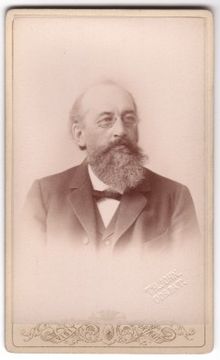Edmund Russow
Baltic German biologist From Wikipedia, the free encyclopedia
Baltic German biologist From Wikipedia, the free encyclopedia
Edmund August Friedrich Russow (Russian: Эдму́нд Фридрихович Ру́ссов, romanized: Èdmúnd Fridrichovič Rússov; 24 February [O.S. 12] 1841 – 11 April [O.S. 30 March] 1897) was a Baltic German biologist.
This article includes a list of general references, but it lacks sufficient corresponding inline citations. (August 2021) |
Edmund Russow | |
|---|---|
 | |
| Born | 24 February [O.S. 12] 1841 |
| Died | 11 April [O.S. 30 March] 1897 (aged 56) Yuryev, Yuryevsky Uyzed, Governorate of Livonia, Russian Empire (present-day Tartu, Tartu County, Estonia) |
| Nationality | Baltic German |
| Alma mater | Imperial University of Dorpat Friedrich-Wilhelm University of Berlin |
| Scientific career | |
| Institutions | Imperial University of Dorpat |
The son of a military engineer, Edmund Russow studied at the Universities of Dorpat (now Tartu, Tartu County, Estonia) and Berlin. In 1867, he became an associate professor at Dorpat, where from 1874 to 1897, he served as a full professor. In 1895-97, he was president of the Estonian Naturalists' Society. Russow was at the forefront of nature conservation in Estonia, and associated with the work of Hugo Conwentz (1865-1922), a founder of nature conservation efforts throughout Europe.
Russow was an authority on Sphagnaceae (sphagnum mosses)[1] and remembered for his research in plant anatomy and histology, in particular studies of the plant family Marsileaceae (aquatic and semi-aquatic ferns).[2] The plant genus Russowia is named in his honor,[3] as is Sphagnum russowii (Russow's sphagnum).
Seamless Wikipedia browsing. On steroids.
Every time you click a link to Wikipedia, Wiktionary or Wikiquote in your browser's search results, it will show the modern Wikiwand interface.
Wikiwand extension is a five stars, simple, with minimum permission required to keep your browsing private, safe and transparent.